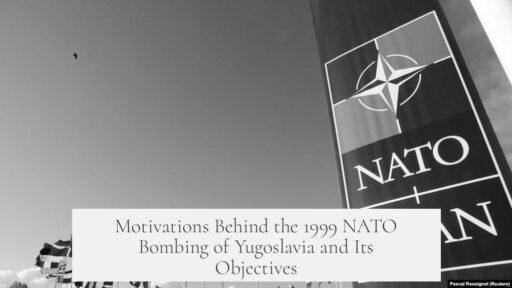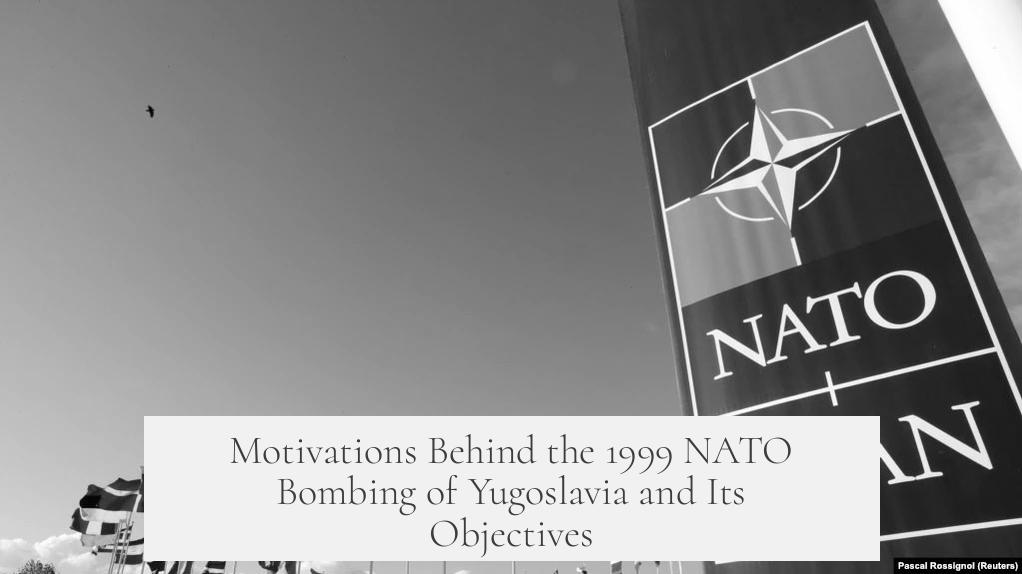The 1999 NATO bombing of Yugoslavia was motivated by several interconnected factors, primarily aimed at preventing a humanitarian crisis in Kosovo, responding to public and political pressures in Europe, and weakening the regime of Slobodan Milošević. NATO sought to halt ethnic cleansing, protect civilians, and alter the political landscape in the region.
One of the main motivations was the fear of a repeat of the Bosnian conflict. In 1998, Kosovo’s situation echoed the earlier Bosnian war, marked by ethnic tensions and violent suppression. NATO feared that the Yugoslav government, led by Milošević, would escalate to widespread ethnic cleansing and massacres, generating large refugee flows. The memory of Bosnia’s destructive civil war and its ethnic brutality shaped NATO’s desire to intervene before Kosovo descended into similar chaos.
European public opinion played a crucial role in pushing NATO toward action. Media reports across Europe extensively covered the atrocities and oppression occurring in Kosovo. Headlines in major cities like London and Berlin raised awareness and concern among citizens. This coverage increased political pressure on European leaders, who felt compelled to respond to the public demand for humanitarian intervention.
A significant factor was the widespread belief that Slobodan Milošević was the root cause of insecurity in the Balkans. He was held responsible for prior conflicts in Croatia and Bosnia and was seen as a destabilizing force obstructing peace. European governments and their publics grew weary of his actions and hoped that NATO’s intervention would humiliate or weaken him, potentially leading to his removal from power or at least curbing his disruptive influence.
Past military experience also influenced NATO’s decision. The 1995 Operation Deliberate Force against Bosnian Serbs was viewed as a model, where a brief bombing campaign contributed to peace negotiations and ended the Bosnian war. NATO leaders believed a similar approach in Kosovo would quickly pressure Milošević to halt his operations. This perceived effectiveness made the prospect of military intervention more appealing and seem more achievable.
The geopolitical context made intervention seem less risky. Serbia was diplomatically isolated; neighboring countries were either hostile, neutral, or aligned with NATO. This isolation limited the chances of regional escalation. Additionally, Russia, Serbia’s traditional ally, was in a weakened state internationally and militarily in 1999. Moscow could provide diplomatic support but was unable to deter NATO militarily or prevent the campaign.
NATO’s objectives during the campaign included stopping ethnic cleansing and a humanitarian catastrophe in Kosovo. The alliance aimed to protect civilians and prevent further massacres and refugee crises. Another goal was to exert pressure on Milošević, to reduce his capacity to destabilize the Balkans. Although regime change was not explicitly stated, removing or neutralizing Milošević was a strategic aim.
| Motivation | Description |
|---|---|
| Fear of “Another Bosnia” | Prevent ethnic cleansing and massacres in Kosovo similar to earlier Bosnian war atrocities. |
| European Public Opinion | Widespread media coverage led to pressure on leaders to act against human rights abuses. |
| Belief that Milošević Was the Problem | Views Milošević as destabilizer; desire to weaken or remove him from power. |
| Previous Military Success (Bosnia) | Operation Deliberate Force success suggested bombing could lead to rapid resolution. |
| Diplomatic Isolation of Serbia | Serbia lacked strong regional allies, reducing intervention risks. |
| Weakness of Russia | Russia unable to challenge NATO’s intervention effectively in 1999. |
- Prevent humanitarian catastrophe and ethnic cleansing in Kosovo.
- Respond to strong European public and political pressure.
- Weaken or neutralize Slobodan Milošević’s influence and destabilizing role.
- Leverage military precedent from Bosnia for a swift resolution.
- Capitalize on Serbia’s regional isolation and diminished Russian influence.




